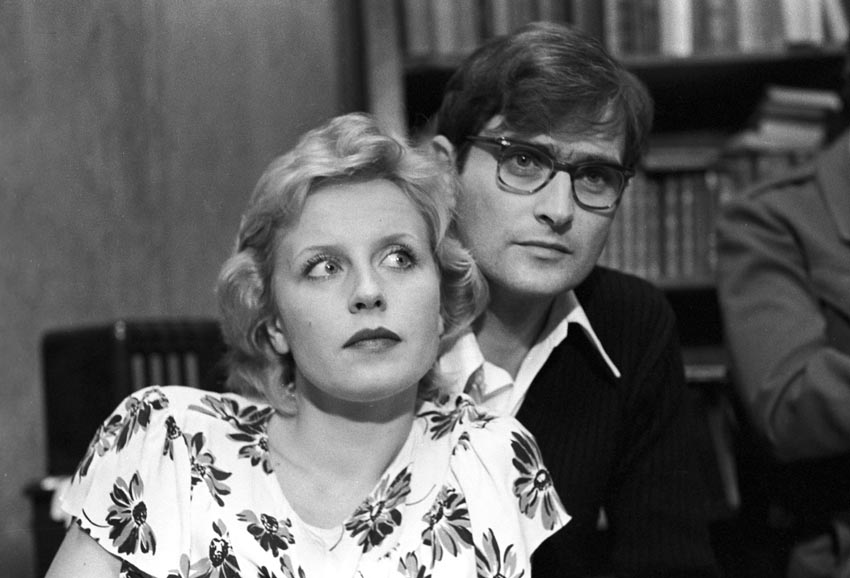Feature film by Ryszard Bugajski, 1982. Poland, early 1950s. Tonia Dziwisz, a third-rate cabaret singer, tours the country to perform for rather undiscerning audiences. One day, after a quarrel with her husband, two men make her drunk and take her, intoxicated, to what turns out to be prison...
 Olgierd Łukaszewicz and Krystyna Janda, sill from Interrogation, photo: National Film Library
Olgierd Łukaszewicz and Krystyna Janda, sill from Interrogation, photo: National Film Library
In the early 1950s Tonia Dziwisz, a third-rate cabaret singer, tours the country to perform for rather undiscerning audiences. One day, after a quarrel with her husband, two men make her drunk and take her, intoxicated, to what turns out to be prison. During the first interrogation a Public Security officer asks her detailed questions about her love life. Tonia tries to give true answers, yet the officer wants more. Slowly, it dawns on her that what they want is for her testimony to incriminate her acquaintance, major Olcha, as a traitor and spy. When Tonia refuses to sign the interrogation report, she is humiliated, threatened with being shot, beaten, undressed naked and poured over with icy water, locked in a punishment cell. Still, she does not break down. Her co-inmate, communist Witkowska, believes that Tonia should plead guilty because "people's government cannot be wrong". Shown her statement admitting marital infidelity, Tonia's husband files for divorce. Lonely and with no support, Tonia tries to commit suicide and is taken to hospital, where on Christmas Eve she is visited by lieutenant Morawski, who had taken over the interrogations. They have a sexual intercourse and Tonia gets pregnant. She promises to Morawski not to reveal the identity of the child's father. She learns that major Olcha has been shot and gives birth to a baby daughter who is taken away from her a few months later.
When Stalin dies, Morawski summons Tonia to his office and tells her that she would soon be released from prison. He also tells her in which orphanage her daughter is staying.
" 'Przesłuchanie' tells of a few-year-long investigation that was supposed to provide evidence against the accused in the so-called splinter cases of the 1950s. The main case was brought against General Stanislaw Tatar and nine senior officers. This is history. The fiction is that a stage actress Tonia, once imprisoned, should confess - such is the interrogator's expectation - to having been an intermediary in passing on espionage stuff. They are not after her or her alleged crime - the objective is to bring charges against a participant of an alleged army plot set up by a group of officers of Home Army, General Anders' Army and of partisan provenance. It is not until long afterwards - during the thaw of 1956 - that it becomes public knowledge that the charges had been fabricated. By then, however, twenty defendants had been executed. Why and what for the cases were fabricated need not be explained to readers from the East and cannot be explained to those from the West.
"Let me quote Anatol Fejgin, one of the heads of the Security Service: 'A 'Trojan horse' concept - of a conspiracy in the army - was developed, whereby foreign intelligence was supposed to plant in the army individuals who would abolish the communist rule in Poland at an opportune moment.' What was needed were facts. Those who cannot understand that it was not aberration, but special Stalinist logic, will not understand 'Przesłuchanie'. They will only see a mutation of a story of cruel policemen in some uncivilized country forcing the victim to reveal where the gold has been hidden. Except that there is no gold here - and the interrogator is perfectly aware of this. The tale told by 'Przesluchanie' is deeper than a story of violence on one hand and of a test of character or courage on the other. It is a film about an individual who grows when faced with an evil attacking the essence of her humanity rather than one who puts herself to a test.
"Tonia refuses to incriminate an innocent man and, perhaps, to cause his death. She soon realizes that refusal alone is too static an act to maintain determination and that open resistance makes one stronger. Determination releases desperate courage, and that in turn triggers off challenge and derision. At this stage Tonia can no longer be forced to anything. The awareness of moral advantage over the interrogators and of one's internal strength can lead to satisfaction which may even be worth giving one's life for" (Bożena Janicka, "Kino" 1989)
- Przesłuchanie / Interrogation, Poland, 1982. Written and directed by Ryszard Bugajski. Director of photography: Jacek Petrycki. The song "Zgadnij kotku": music by Jerzy Satanowski, lyric by Jacek Janczarski and film songs of 1930s and 1950s. Production design by: Janusz Sosnowski, Edward Papierski, Magdalena Dipont. Sound by: Danuta Zankowska, Tadeusz Wosinski. Film Editor: Katarzyna Maciejko, Jacek Palubinski. Featuring: Krystyna Janda (Antonina "Tonia" Dziwisz), Adam Ferency (Tadeusz Morawski), Janusz Gajos (Major Zawada "Kąpielowy"), Agnieszka Holland (Communist Witkowska), Anna Romantowska (Mira Szejnert), Bożena Dykiel (Honorata), Olgierd Łukaszewicz (Konstanty Dziwisz - Tonia's husband). Produced by: Zespół Filmowy X, WFD Warszawa, 1982. Color, 16 mm and 35 mm, 3196 m.
Awards:
- Journalists Award and Audience Award for Ryszard Bugajski at the Polish Feature Film Festival Gdynia '89;
- Special Jury Awards, Zlote Lwy Gdanskie (Gdansk Golden Lions) for Krystyna Janda and Janusz Gajos (leading roles) and for Anna Romantowska (supporting role) at the Polish Feature Film Festival Gdynia '90;
- Best Actress Award for Krystyna Janda at IFF Cannes '90;
- Silver Hugo for Ryszard Bugajski (director) at IFF Chicago '90;
- Best Actress Award for Krystyna Janda at International Festival of Central-European Films; award of the Yugoslavian section of FIPRESCI for Ryszard Bugajski, Belgrade '91.